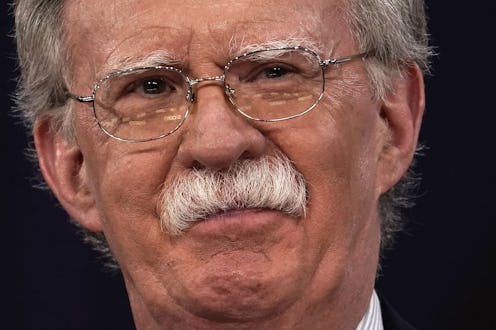News
What To Know About Trump's New National Security Adviser & His Controversial Track Record

White House officials told the New York Times on Thursday that Republican diplomat and lawyer John Bolton will be President Trump's national security adviser, taking over the position from Gen. H. R. McMaster as Donald Trump's next national security adviser in April. On Twitter, Trump announced the shakeup in positive terms, indicating that McMaster's removal was amicable.
"I am pleased to announce that, effective 4/9/18, @AmbJohnBolton will be my new National Security Advisor," he tweeted. "I am very thankful for the service of General H.R. McMaster who has done an outstanding job [and] will always remain my friend. There will be an official contact handover on 4/9."
So, who exactly is Bolton? The Republican — who is known for his hawkish views, including openly advocating for war with North Korea and for bombing Iran — has some experience working for other U.S. presidents. During George W. Bush's presidency, Bolton worked as the U.S. ambassador to the United Nations from August 2005 to December 2006. In 2012, he offered foreign policy advice to then-presidential candidate Mitt Romney of the Republican party.
Although politics inform a good deal of Bolton's professional resume, he is also known for appearing in media to share his two cents on matters mostly related to America's foreign policy. He's no stranger to appearing on Fox News as a political commentator while talking about North Korea, Russia, Syria, Trump's first State of the Union address, Iran, Turkey, and much more.
In spite of Trump's apparent confidence in Bolton, some foreign policy experts are not so excited about the president's new national security adviser pick. In fact, some have go on record to say that Bolton would be a complete disaster for the country's foreign relations. In a conversation with Vox reporter Zack Beauchamp, Christopher Preble of the libertarian Cato Institute said that Bolton should not be in such a powerful position at all.
Preble, who is the group's vice president for foreign policy studies, told Beauchamp, "I operate on the assumption that John Bolton should be kept as far away from the levers of foreign policy as possible. I think I would rest easy if he was dog catcher in Stone Mountain, Georgia. But maybe not."
Preble is not alone in his wariness. In a CNN opinion-editorial, Johns Hopkins University School of Advanced International Studies' senior fellow David Rothkopf also cautioned against Bolton and said that Bolton had "distinguished himself as one of America's most hawkish and ineffective diplomats for decades" who would promote, not mitigate, regional conflicts in the world.
It doesn't take in-depth interviews with foreign policy analysts to see why some people are not exactly thrilled to see Bolton advise Trump on top — and often fragile — foreign policy issues. One look at his political past shows his remarkably extreme positions on foreign relations, including his advocacy for invading and attacking Iraq, and using harsh and inflammatory rhetoric against North Korea, Iran, and Iraq under Bush's administration. (He once also wrote an op-ed in The New York Times titled, "To Stop Iran's Bomb, Bomb Iran.")
That's not all. In 2002, Bolton also argued that the United States should attack Cuba over biological weapons that did not exist. It was such a controversial position that lacked basic substantiation that, according to Arms Control's website, the State Department's then-top biological weapons analyst, Christian Westermann, refused to approve Bolton's suggestion.
If his stances on foreign diplomacy aren't enough to cause worry among some observers, Bolton's sense of humor has led to discomfort and even criticism in the past. According to a Democracy Now! report, Bolton joked about taking down 10 stories off of the United Nations' building in New York City. "The Secretariat building in New York has 38 stories," Bolton said in 1994. "If it lost 10 stories, it wouldn’t make a bit of difference." With such a controversial political past, it's no surprise that some balk at the idea of him as America's national security adviser.